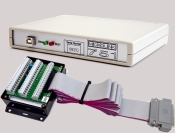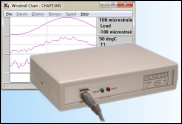The 851-SG package comprises Windmill data acquisition and control software, a data logger to monitor 16 strain gauges and strain gauge excitation.
Price: 875 GB pounds.
Features
- Monitor strain gauges, pressure transducers or voltage signals, through 16 differential input channels
- Can also monitor digital inputs, count, control digital outputs and measure temperature, pressure, flow, level, etc (extra hardware may be needed)
- Read data over an Ethernet network or over the Internet
- Includes the powerful yet easy-to-use Windmill Software for Windows: no programming required
- Automatic ranging lets the software match the strain signal as closely as possible
- Integrating analogue-to-digital converter reduces electrical noise
- Use software to select the resolution of the A-D converter from 12- to 18-bits: choose between high resolution and high speed
- Automatic recalibration
- Set two alarms on each strain gauge
- Measurements returned in microstrain, or engineering units of your choice
- Use for real-time data acquisition on your PC or for stand-alone data logging
- Free technical support for life and money-back guarantee if not satisfied
Strain Measurement
The 851-SG package comprises an 851 data logger, a strain connection box and Windmill data acquisition software. Just connect your strain gauges to the strain box, plug the box into the 851 Data Logger and away you go. This method of connection means you can use the 851 Data Logger to monitor, for example, temperature at the same time as strain.
With the 851-SG package you can monitor strain gauge bridges and balanced bridges such as pressure transducers. You can configure individual channels to accept any of these inputs:
- voltage
- quarter bridge: single strain gauge
- half bridge: tensile + compressive strain gauge
- half bridge: normal + transverse strain gauge
- full bridge: 2 tensile + 2 compressive gauges
- full bridge: 2 normal + 2 transverse gauges
- full bridge: tensile normal + compressive normal + tensile transverse + compressive transverse gauge
Strain gauges need an external excitation voltage to supply sufficient current to keep all the bridge circuits energised. The 851-SG package provides four sets of 16 screw terminals giving + and - excitation and signals for each of 16 bridges. Two 1 kOhm termination resistors are mounted in half bridge configuration whilst high quality 350 and 120 Ohm resistors can be provided for the completion of quarter bridges.
When a bridge input is selected the Windmill software monitors excitation voltage and performs the bridge calculation to produce a reading in microstrain. This eliminates errors due to changes in excitation voltage.
The initial unstrained bridge measurement is often much larger than the change in signal due to strain. If this initial value is not accounted for, it restricts the resolution you can obtain - i.e. the smallest signal you can measure. Windmill software can zero or balance the bridge, nulling the offset of the initial voltage. So instead of measuring over a wide range, 0 to 0.5 V for example, you can choose a narrow range such as 0 to 0.01 V.
Each range is divided into a fixed number of steps: the resolution. The smaller the range and the larger the resolution, the more precise the reading. The 851-SG offers a choice of resolutions from 12-bit for fast sampling to 18-bit for greater precision.
Set Alarms on Each Strain Gauge
You can set two alarm levels on each strain gauge and specify what happens when an alarm threshold is crossed, for example other equipment could be switched on.
Digital Inputs and Outputs
The 851-SG provides 32 digital I/O lines, arranged in four groups of 8. Use Windmill to choose whether each group is an input or an output. You can read or set the state of each line individually. Alternatively, you can switch several channels at the same time.
Counters
The unit has eight 23-bit totalling counters. Each counter starts at zero and counts pulses to a maximum of 1 million. You can reset a counter at any time from Windmill software. You can use the counters in two modes: accumulating count and resetting count. In accumulating count the counter keeps counting until you reset it. In resetting count the counter shows the number of pulses since the last reading.
You can set a scale and offset factor to the count from software. For example if the pulses came from a flow meter which produced one pulse for every 50 millilitres, a scale factor of 0.05 would give a reading in litres.
The counters are found on 8 of the digital input and output lines. You can use any of these you don't need for counting as normal digital inputs: the counts are always maintained even if you don't plan to use them.
Software
Windmill Software is included in the 851-sg package. This modular suite offers data logging, charting, alarm indication, output control, process mimic generators, sequence control, programming tools and other applications.
.
Free Technical Support and Money-Back Guarantee
All our systems come with free technical support for life and a guarantee that if you aren't satisfied we'll give you your money back.
Dimensions (mm) 180 x 120 x 40
Maximum logging speed 10 scans a second
Memory 65000 scans
SOFTWARE
Operating system Windows 10, 8, 7 64-bit, 7 32-bit
Vista, XP, 2000 or 98
ANALOGUE INPUTS
Maximum # inputs 16 differential
Maximum safe input voltage:
Power supply on ±48 V
Power supply off ±33 V
Transient ±300 V
Amplifier:
Ranges (V) ±0.01, ±0.1, ±1, ±10
Common mode range ±13 V
Relative accuracy of ranges:
gain = 1000 ±0.1%
gain = 1, 10, 100 ±0.05%
Analogue to Digital Converter:
Maximum linearity error ±0.02%
Resolution Integration Time Samples/Second
12 bits 2.5 msec 80
13 bits 5 msec 64
14 bits 10 msec 48
15 bits 20 msec 32
16 bits 40 msec 16
18 bits 160 msec 6
DIGITAL INPUTS/OUTPUTS
Maximum # inputs 32
Maximum # outputs 32
(selected through Windmill in ports of 8 lines)
Power-up state all inputs
Compatibility TTL and 5 V CMOS, can be made
contact closure compatible
Range 0 to 5 V
Output capability 15 LSTLL loads
Maximum I/O speed 160 channels per second
COUNTERS
Maximum # counters 8
Resolution 23 bits
Maximum count (events) 1000000
Maximum frequency 5 kHz
Minimum pulse width 500 µseconds
Frequency gate times 1 or 10 seconds
Compatibility TTL, 5 V CMOS, can be made
contact closure compatible
Input voltage range 0 to 5 V





